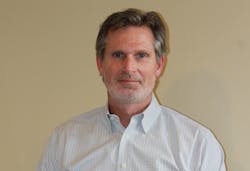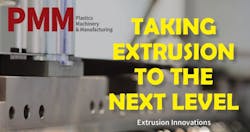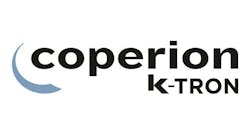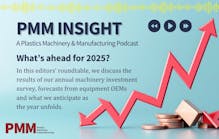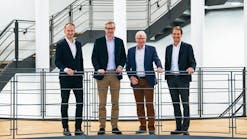By Bruce Geiselman
As the head of Davis-Standard, Giovanni Spitale has an unusual background.
Unlike many executives who work their way up in the plastics industry, the U.S. Navy Nuclear Power School graduate spent much of his time in the aerospace industry.
“That’s the first of many unorthodox things you're going to discover about me today,” Spitale told Plastics Machinery & Manufacturing Senior Staff Reporter Bruce Geiselman during a recent interview.
He also might be the only industry CEO who once ran a nuclear reactor aboard a U.S. aircraft carrier as a nuclear power plant supervisor, serving aboard the USS Abraham Lincoln.
After the Navy, he worked at companies including Honeywell and GE Aviation. Between 2019 and 2022, Spitale served as VP of commercial parts within Boeing Global Services, where had responsibility for profit-and-loss management and the strategic direction of the company’s $4 billion portfolio of commercial aircraft and engine parts businesses.
His experience in the aviation industry helped prepared him to lead Davis-Standard, said Spitale, who has been president of the extrusion machinery maker since February 2022.
When and how were you first exposed to the plastics industry?
Spitale: In the aviation industry, there is a lot of consumption of plastic, and I was always curious about how it was made — how does this plastic part get formed in the shape and whatnot? So, I was somewhat familiar just from a curiosity perspective, and then my first exposure in working in plastics was at Milacron [between 2017 and 2019].
My title started off as chief marketing officer, and then it became president of commercial service and support. My job really was to figure out how to revitalize the Milacron approach to customer service and spare parts — all the stuff that has to happen post-delivery to make sure that the customer gets the full utility out of that expensive asset they bought.
What is it about the plastics industry that appealed to you?
Spitale: It is such a prevalent force in our everyday lives, I can't imagine life without it.
In my personal life, I'd always look at plastics and say, “What a marvel. How's this made?” Something that's liquid then turns into this sound structure akin to casting of a metal. It was interesting, the strength and light weight that could come from plastics. On my engineering side, throughout my entire career, I've had an appreciation for it. In the aviation industry, we used plastic in pursuit of strength and light weight simultaneously combined into one. So, the chance to come view plastics from the other side and participate in seeing how that stuff is made and participate in all the challenges associated with being in the plastics industry is exciting.
It's been interesting to me to see the parallels of business and technology problems that exist in aviation and in plastics. If you think about the business lifecycle of aviation, a customer buys a very expensive asset, and they need it to perform exactly as it was specified to make their business case. It has to fly so many people on so many gallons of gas to a certain destination. It’s the same thing in plastics; they buy a very expensive production line, and they need it to perform exactly as we sold it to them. It needs to run so many meters of plastic per minute. It needs certain quality aspects to be there. It needs no more than the allocated amount of downtime. So, reliability has to be there. It's interesting how the engineering is maybe slightly of a different vein, but the parallels are the same. Taking what I've learned in one industry and applying it to another has been an exciting part of my career.
How and why did you join Davis-Standard?
Spitale: My time at Milacron was exciting, and then for a bit after that, I went back to the aviation career that I know. I spent a couple of years at Boeing.
I got introduced to the Gamut Capital team prior to the Davis-Standard acquisition, and I got to know them a little bit. I really liked their operating philosophy on how they like to partner with operating leadership and provide the financial sponsorship that aligns with the company strategy.
So, when I was presented with the opportunity to join a premium brand in the plastics industry in this capacity, it was an exciting proposition.
You jumped right to the top, didn't you?
Spitale: I read your interview with my predecessor, Jim Murphy, and he had a star of a career inside Davis-Standard beginning with sales experience and ultimately leading to this position. I'm thinking, “Wow, I'm really thin on Davis-Standard.” It was a great handoff from Jim to me. We spent a lot of time together, and we still do. So, although this is my first job at Davis-Standard, I feel like I've been here forever.
Can you describe a little bit about your day-to-day responsibilities as CEO of Davis-Standard?
Spitale: I think the glamour of the title aside, everything is my responsibility.
We have 1,530 employees, and they and their families depend on the decisions that we as the leadership team get right in terms of keeping the business healthy and on a path toward perpetual existence and relevance in our industry. So, I think my responsibilities really are to lead the development of our strategy and communicate that strategy effectively and organize and prioritize everything we do around the execution of that strategy so that we're all pulling in the same direction.
What have you found most rewarding about your career in the plastics industry?
Spitale: So far, the people — the people and their passion for our products, our existence. Our customers are absolutely unbelievable. We are deeply invested in our customers' success. The spirit that I found within the entire Davis-Standard team is absolutely amazing.
I think what I've enjoyed most is seeing the parallels from one industry to another. There's a consistency of operating with high integrity, of being truthful and honest in your business dealings and really focusing on what the customer wants and needs from us.
What trends are you seeing in the plastics industry?
Spitale: 2021 and 2022 have been off the charts. We, along with everybody else, has an order book that's bursting at the seams. It's been just a phenomenal couple of years for us and our industry and really helped the world survive when it comes to all the things that we all had to do to deal with COVID.
If you think about it, Amazon orders went through the roof, and food delivery and cooking at home or ordering takeout went through the roof. Our industry provided the capacity to enable that to happen. We feel that tapering now. So, I think for the next couple of years, we're going to see a moderation of new capital equipment being added. Our customers will instead focus on getting maximum utilization from the things they've already bought.
There are also a lot of trends. We see our customers thinking about their footprint in a slightly different way. Everybody's familiar with the story of how a shipping container from China to the U.S., if you could get one, went from 4,000 bucks for the container to 50,000 bucks, or whatever the spot price was. So, the cost of shipping went way up, and the logistics of running a supply chain went totally askew from any historical factors. So, we see a lot of re-examination of what a healthy supply chain footprint might look like.
And then there’s just an enhanced focus on ESG [Environmental, Social and Governance initiatives] and what it means to be a good corporate citizen. We're all aware of the changing climate that we're dealing with. I think there's a real focus on trying to make sure that the plastics’ place in the social corporate responsibility spectrum fits where it's supposed to fit.
What changes have you noticed in recent years in customers’ demands for equipment?
Spitale: Manufacturing in general worldwide has really become more digitally enabled.
The digital connectivity and the flow-through of the original design to the bill of materials and all the things that it needs to do to support the end customer, I think has been, maybe, you could call it the fourth industrial revolution.
Everybody looks at IIoT and thinks about the operational piece of it, but if you back drive that all the way to the fundamental construction of machinery, the digital connectivity is showing itself in how we manufacture, assemble and support. I think that's a trend that will continue.
What do you think of this trend toward Industry 4.0?
Spitale: I'm a huge fan. I'm a believer.
I think it's super-exciting and there’s a lot of potential, but I think it will be somewhat pragmatic or measured in its penetration in the plastics space. It needs to earn its way in. It isn't a magic solution to anything. The tangible benefits of operational efficiency, overall equipment effectiveness and reduced downtime, better service, etc., have to earn their way in.
The other end of that Industry 4.0 spectrum is how the engineering tool chain is connected, and ultimately those two come together, and that's really where the power of a digital twin might manifest itself. But that's going to be years in the making. I am a believer, but I think it's going to be a decade-long journey before it's prolific in our industry.
Who was your mentor? Whom did you admire and why?
Spitale: I think almost everyone has something to teach. I like to learn from people both what to do and what not to do. So, it's difficult, but I will name a few that really stood out as being particularly instrumental.
At Honeywell, [company executives] TK Kallenbach and Carl Esposito really helped me understand what was possible with a career. I was in the military as a young idealistic engineer, and they helped me understand where I could go and what was available to me as a career pursuit.
And then Rob Wilson, who ran Honeywell aerospace during that time and a little bit later, also was very instrumental in helping me fulfill my potential and really set goals for myself and achieve them.
Lastly, the last two years I spent at Boeing, I worked for a gentleman named Brendan Curran, who was particularly good at leading through teaching moments and his pragmatic, intense focus. His teaching methods really inspired me to think about how not only I do what I do, but how I empower others to be their best as well.
Then there were also just some great people at Milacron I worked with. One of them now is on my board, Brian Marston. He has been particularly helpful in helping me to get grounded in the plastics industry, and make connections, and get to know people, and is just an all-around general partner as I've made this transition. There’s a broad spectrum of really influential characters over my career.
When you first became CEO at Davis-Standard, did you face any major challenges?
Spitale: Sure. Let's face it, I'm an industry outsider.
Getting grounded and really understanding the lingo, the terminology, the different acronyms, just all those things that you might expect when an outsider comes into a new environment. It's like being a soccer player and moving to a baseball team. I had to learn. I'm physically fit; I can do it, but I've got to learn a whole new set of rules and a whole new set of players. Brian Marston helping me to facilitate some of those introductions and helping me get my feet grounded in this industry in particular, and this time, I intend to stay. So, I'm working really hard to establish those connections.
What's the greatest challenge that you faced in your business career?
Spitale: It’s sort of a personal one, I think. Understanding and accepting where my place is and what I'm good at was a very humbling moment.
Early in my career, I thought I was destined to invent the future of something. What I learned was that was not my place.
So, understanding and accepting really what you're good at leads to the passion around performing that task. As a personal challenge, just the transition from what I thought my destiny was to what I learned my real destiny was and then embracing that.
What do you see as the next major development in extrusion technology?
Spitale: I think that digital enablement of the entire value stream will continue in force. I also think that as an industry, we will continue to advance in alternative and recycled materials and then the broad spectrum of ESG initiatives of doing more with less — less energy, less waste, less environmental impact in general. I think for the foreseeable future, those are going to be the focus of most of the R&D efforts.
What about longer term, say 10 or 20 years from now? How do you think the technology will change?
Spitale: I believe it will continue to evolve with our end markets. If we think about what's happening in the world, the electrification phenomenon is here to stay.
I think there will be a long-term emphasis on recycling infrastructure and using more recycled materials.
And then I think there will be some elements or some particular segments where alternative materials maybe come in and either augment or replace plastic as the most appropriate medium, maybe using the same production techniques, just not polymer-based.
The plastics industry has been suffering from poor public perception. What does the industry need to do to improve its image?
Spitale: I have conversations with friends about plastics, and sometimes that negative perception shows up, and I ask them: What do you think your car would be like today if it weren't for plastics? It would weigh 3,000 pounds more than it does today, and you'd burn an extra 2 gallons of gas every day. The environmentalism aspect of what we do needs to be more clearly communicated and sharpened, focusing on the benefits that we provide, instead of just focusing on the fact that it is plastic.
I think there's also the pragmatism and the education of the public about where plastics really are the material of choice. I mentioned one: automobiles, the lightweighting of cars and airplanes. Airplanes today, the comforts you enjoy when you fly all the places we like to go are only possible because there's so much plastic content that the weight is light enough to enable that to happen.
If you look at some studies around a plastic grocery bag versus a paper grocery bag, the energy consumption and the deforestation impact of making a paper bag clearly favors plastic, as long as we can keep the plastic bag out of the ocean when it's used.
I believe that plastics truly is a critical part of modern life — can you imagine your life without plastics? We need to focus on infrastructure and human behavior to ensure that we enable the benefits of plastics products and eliminate the trash and waste problem. The National Geographic picture of a turtle with a straw up its nose does not mean that plastic is inherently bad — it just means we need to keep it out of the oceans.
Do you think the plastics industry can play a role in in trying to improve the recycling market?
Spitale: We will need a combination of industry capability and government policy to move plastics toward sustainability goals — and to do that we need close working relationships between industry and government, and lobbying work is a key part of that.
I'm not saying this is the right way to approach it, but in Europe, we see countries where recycling is a much higher percentage of the overall consumption than in the U.S. Why? It's because they tax it, and they have the infrastructure to collect, sort and use it. I think it's going to take a combination of public perception, which leads to behavior: “I'm willing to wash it and recycle it so that it can be reused,” and then the infrastructure to collect it and properly feed it, and that's hard for private industry to do because it's so expensive and expansive that, unless it's done at a national level, it's very hard to make it impactful.
I do think plastics will have a role in arguing for it, but ultimately it will have to be a government or government-like organization that facilitates that transformation.
Do you have any hobbies?
Spitale: I'm an outdoorsman all the way. I mountaineer and ski in winter and cycle and hike in summer. I'm all about the outdoors.
I've done Rainier twice. The highest I've been is a mountain in Mexico called Pico de Orizaba. It's almost 19,000 feet; it's awfully hard to breathe at 19,000 feet.
And I'm a motorhead. I love cars. I love horsepower. I remember reading Car & Driver magazine as a 5-year-old, drooling about all the cars that I wished I could afford someday.
Those things keep me occupied every moment I'm not in the office.
What has been your greatest plastics-industry accomplishment?
Spitale: It's still very early. One of the next stages that Davis-Standard needed to enter was the transition from a product-based organization and mindset to a market-based organization and mindset. We are in the process of standing that up. It’s the organizational evolution from thinking about each piece of machinery as a product or even a linkage of them as a production line, to a market-segment-facing organization really anchored to the fundamentals of what moves our end markets that we serve and what makes them function and what will they need from us, not only now, but 20 years in the future.
It's been rewarding, and I believe that this will be a transformational act for Davis-Standard. I hope to set the stage for the next 174 years.
JUST THE FACTS
Who is he: Giovanni Spitale, Davis-Standard CEO.
Education: U.S. Navy Nuclear Power School, 1993; Thomas Edison State University, Trenton, N.J., bachelor’s in nuclear engineering technology, 2005; Arizona State University, Tempe, Ariz., Master of Business Administration, 2007.
Years in the plastics industry: 3
Age: 50
Company founded: 1848
Employees: 1,530
Bruce Geiselman | Senior Staff Reporter
Senior Staff Reporter Bruce Geiselman covers extrusion, blow molding, additive manufacturing, automation and end markets including automotive and packaging. He also writes features, including In Other Words and Problem Solved, for Plastics Machinery & Manufacturing, Plastics Recycling and The Journal of Blow Molding. He has extensive experience in daily and magazine journalism.
eBook: Taking extrusion to the next level
Brückner Group announces management changes

